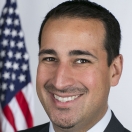
As you might have seen, House Republicans released their Fiscal Year 2016 budget this week -- and to put it very simply, its priorities are pretty different from those in the President's budget. The House GOP would cut taxes for millionaires and billionaires, all while slashing investments in the middle class that we know would grow the economy -- particularly in job training, manufacturing, and education.
Their budget would cut funding for pre-k through 12 education by $3.1 billion. This includes a $1.2 billion cut for Title I funding -- money that could fund 4,500 schools, 17,000 teachers and aides, and 1.9 million students.
Earlier this week, the President met with superintendents and other school officials from all across the country. Each of them brought at least one object -- from photos to books to charts -- that represented what this vital funding means to their school districts.
Every American should know exactly what disinvestment in Pre-K through 12 education would mean for school districts around the country. Listen to each of these school leaders describe the vital programs in their districts that Title I helps fund.
1. "Acceleration Academies" that provide a month's worth of learning in one week's time.
Michael O'Neill, Chairperson of the Boston School Committee (Boston, MA)
2. A "Parent Academy" that has helped more than 3,000 parents prepare their kids to apply for college.
Barbara Jenkins, Superintendent, Orange County Public Schools (Orange County, FL)
3. "Parent University" college bus tours that make college a reality for more underserved kids.
Eric Gordon, Superintendent, Cleveland Metropolitan School District (Cleveland, OH)
4. A "Focus on Freshman" mentorship program that has increased graduation rates by more than 10 percent.
Valeria Silva, Superintendent, ISD 625 - St. Paul Public Schools (St. Paul, MN)
5. Extended school days that result in double-digit gains in math and reading scores.
Kaya Henderson, D.C. Superintendent of Public Instruction (Washington, D.C.)
6. Mentorship programs that connect students with professionals in cutting-edge fields.
Juan Cabrera, Superintendent, El Paso Independent School District (El Paso, TX)
7. Smaller classes that provide more direct attention to students in need of support.
Richard Carranza, Superintendent, San Francisco Unified School District (San Francisco, CA)
8. College and career-preparation programs that make sure students have the skills they need to succeed.
Darienne Driver, Superintendent, Milwaukee Public Schools (Milwaukee, WI)
9. Development classes that have reduced truancy issues among young black students.
Jumoke Hinton, Board Member, Oakland Unified School District (Oakland, CA)
10. An after-school robotics team that competes regionally.
Airick West, Board Member, Kansas City Public Schools (Kansas City, MO)
At a time when it's more important than ever to make sure young people have the skills they need to compete in a modern economy, the House Republican budget would bring per-pupil education funding to its lowest levels since 2000.
If you don't want to see programs like these rolled back, then make sure as many people as possible know what's at stake.
Related items you should read:
- Quiz: If You Were in Charge of the Nation's Budget, What Would You Do?
- Video: President Obama Meets with Superintendents from Around the Country
- Asked and Answered: Matthew's Letter to the President
- Senior Advisor Brian Deese on Medium: Building on a Uniquely American Recovery


